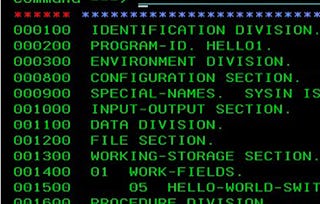This course is geared towards anyone interested in learning about IBM, COBOL, mainframe computing, and the Software Development Lifecycle (SDLC) and increasing their knowledge and hands on experience with core concepts and technologies including life cycle and systems analysis concepts, design and structured coding, and a wide variety of topics designed to provide relevant, requisite working knowledge and practical experience.


IBM COBOL Software Development Process


IBM COBOL Software Development Process
This course is part of IBM Mainframe Developer Professional Certificate

Instructor: LearnQuest Network
3,194 already enrolled
Included with
65 reviews
Skills you'll gain
Details to know

Add to your LinkedIn profile
See how employees at top companies are mastering in-demand skills

Build your Software Development expertise
- Learn new concepts from industry experts
- Gain a foundational understanding of a subject or tool
- Develop job-relevant skills with hands-on projects
- Earn a shareable career certificate from IBM

There are 5 modules in this course
In this module, we will welcome everyone to the course, present the course objectives, and introduce ourselves to the class.
What's included
4 videos2 readings
In this module, we'll describe life cycle concepts associated with IBM COBOL and IBM z/OS environments, including the software development lifecycle (SDLC), the phases of a SDLC, and Agile/Scrum methodologies.
What's included
9 videos3 readings4 assignments1 peer review1 app item
In this module, we'll define systems analysis concepts associated with COBOL and IBM z/OS environments, including core areas of analysis, objectives of system analysis, and IBM systems architectures.
What's included
8 videos3 readings4 assignments1 peer review1 app item
In the fourth module of this course, we will identify design and structured coding concepts associated with COBOL and IBM z/OS environments, including: pseudocode, modern design, planning and unit testing, and top-bottom testing.
What's included
10 videos4 readings5 assignments1 peer review1 app item
In this module, we will congratulate everyone for completing the course, present the completed course objectives, and define other pertinent course details and next steps.
What's included
3 videos
Earn a career certificate
Add this credential to your LinkedIn profile, resume, or CV. Share it on social media and in your performance review.
Instructor

Explore more from Software Development
 Status: Free Trial
Status: Free Trial Status: Free Trial
Status: Free Trial Status: Free Trial
Status: Free TrialIBM
 Status: Free Trial
Status: Free TrialIBM
Why people choose Coursera for their career

Felipe M.

Jennifer J.

Larry W.

Chaitanya A.
Learner reviews
- 5 stars
61.53%
- 4 stars
15.38%
- 3 stars
13.84%
- 2 stars
3.07%
- 1 star
6.15%
Showing 3 of 65
Reviewed on Oct 30, 2025
tradução acabou atrapalhando, mas tem um ótimo conteudo.
Reviewed on Nov 23, 2025
I am so happy for this opportunity and I really enjoyed the learning process! Great resources and instructors! I enjoyed the whole course!
Reviewed on Dec 2, 2025
Some items have a wrong doc link (reading material)

Open new doors with Coursera Plus
Unlimited access to 10,000+ world-class courses, hands-on projects, and job-ready certificate programs - all included in your subscription
Advance your career with an online degree
Earn a degree from world-class universities - 100% online
Join over 3,400 global companies that choose Coursera for Business
Upskill your employees to excel in the digital economy
Frequently asked questions
To access the course materials, assignments and to earn a Certificate, you will need to purchase the Certificate experience when you enroll in a course. You can try a Free Trial instead, or apply for Financial Aid. The course may offer 'Full Course, No Certificate' instead. This option lets you see all course materials, submit required assessments, and get a final grade. This also means that you will not be able to purchase a Certificate experience.
When you enroll in the course, you get access to all of the courses in the Certificate, and you earn a certificate when you complete the work. Your electronic Certificate will be added to your Accomplishments page - from there, you can print your Certificate or add it to your LinkedIn profile.
More questions
Financial aid available,
¹ Some assignments in this course are AI-graded. For these assignments, your data will be used in accordance with Coursera's Privacy Notice.



